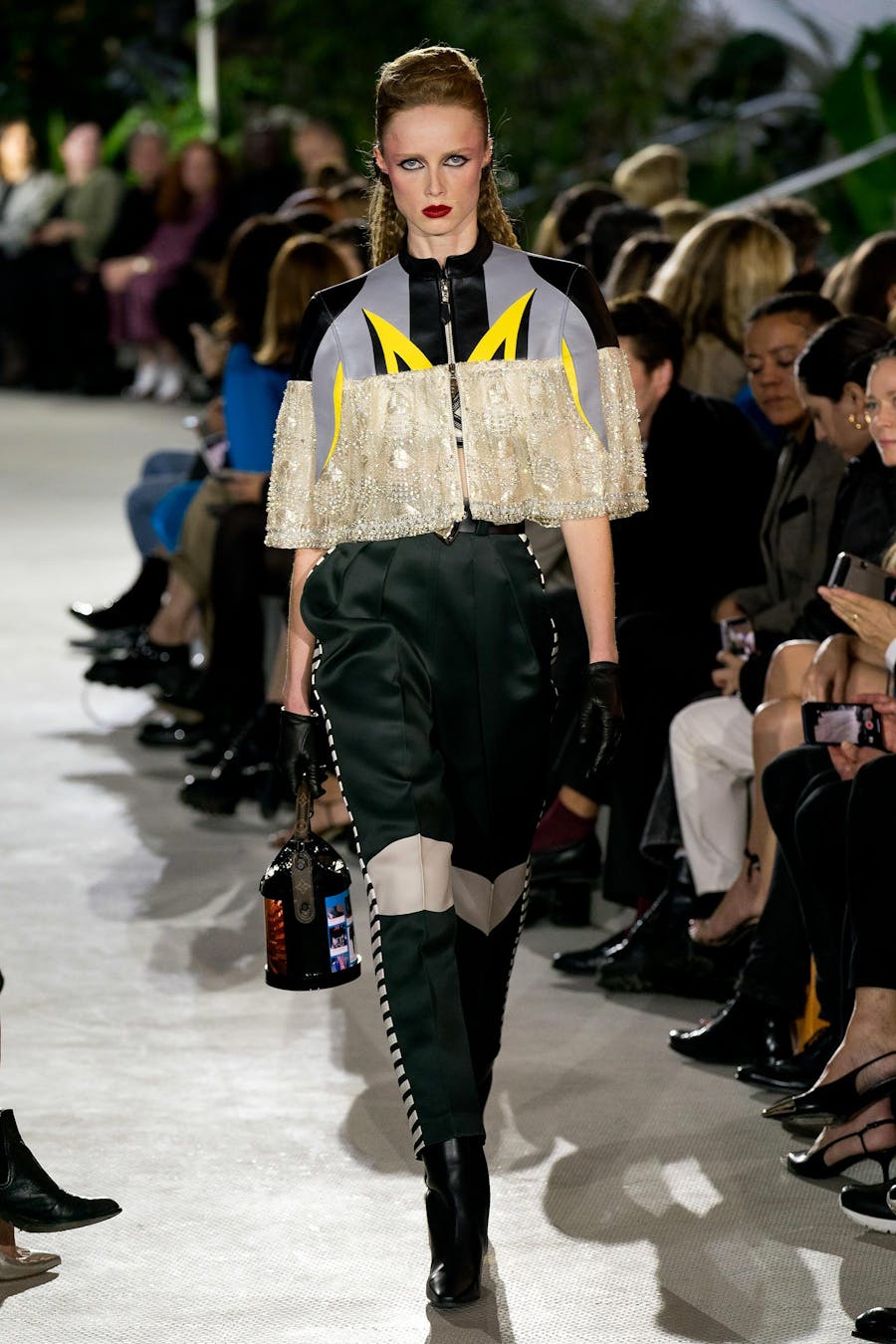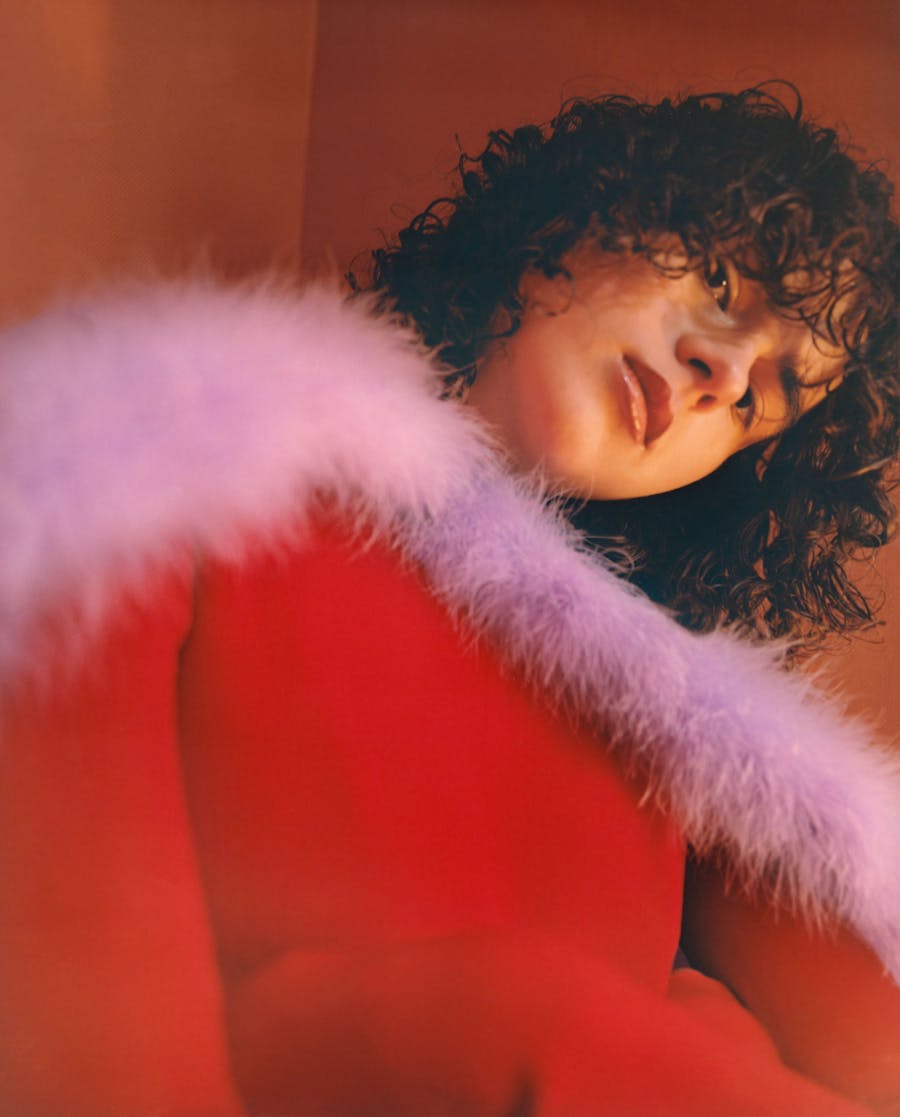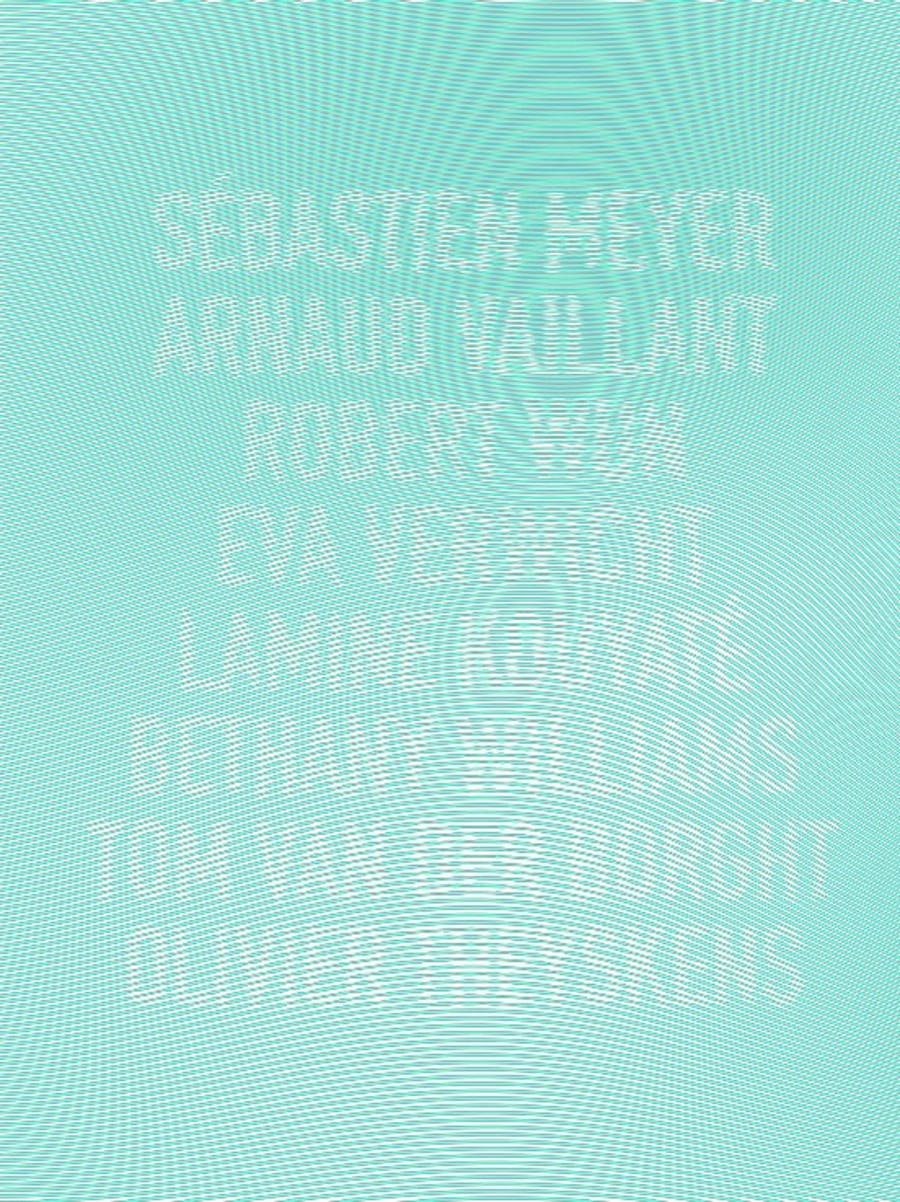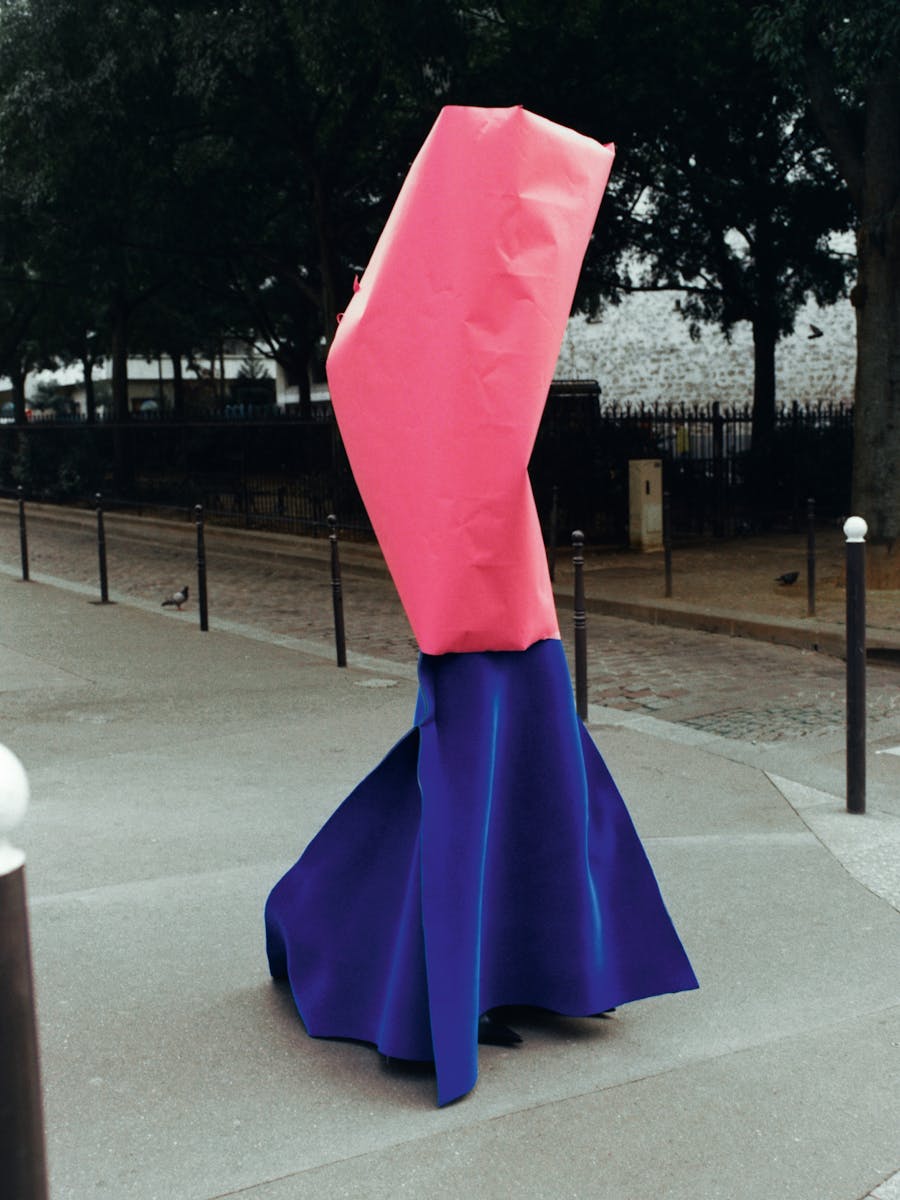They are couturiers, artists, thinkers, fashion designers… Each season, their perceptions of the world generate new landscapes from which we in turn can draw creative inspiration. To come to life, art and fashion need their imaginations.
Exhibition met 15 creatives to ask them what occupies and stimulates their imaginations but also how they protect this faculty in an era where the most sensitive elements of our selves are subject to quantification.
If we see in their works fragments of our dreams, their answers, gathered here, are the pieces of a phantasmagorical jigsaw, with no guidance or rules, in which the only limit is the imagination of the reader who wanders among them.
Christelle Kocher, founder and artistic director of Koché.
“The man who cannot visualize a horse galloping on a tomato is an idiot.” It’s a quote from the French poet André Breton which I’ve always loved. Imagination is maybe nowadays the only part of our world that no one can control. Nobody can stop you from creating thoughts, ideas, worlds, fantasies. There is no reality if there is no fiction or illusion, it’s its complement, the other side of the mirror, mysterious, blurred, incontrollable.
The imaginary does not dissociate oneself from the real world, but it just makes it more interesting.
In my daily practice, my imagination is like a miracle space where anything can happen.
I would not be able to create if I couldn't come back to it on a daily basis. Of course you shouldn’t stay stuck in your inner world, you need to deal with reality; it's a matter of finding the right balance. In these dark days, of so much anxiety and so much unknown, the imagination is the place where colours can shine bright. I will finish with this beautiful quote from Jean-Jacques Rousseau: “The real world has its limits; the imaginary world is infinite.”
Thierry Dreyfus, founder and CEO of EYESIGHT GROUP, scenographer, anartist.
“My imagination is full of light, colours, peace, drawings in pen and Indian ink, landscapes, laughter, friends, theatre and lights.
Anything can set it off: a word, a smell, something we hear, a movement of the neck, the shoulder, the nape, a (natural) scent, a smile, the corner of someone’s lips, the way their feet are positioned, a curve, a shadow, clouds, a light, a line from a book…
To protect it, you just have to be yourself, yourself alone.
Social networks are tools, just tools: a hammer can help sink a nail or kill someone. You just have to not let yourself be controlled by those networks we’re all obsessed with, though they are useful…”
Frédéric Sanchez, composer and musical director.
“My imagination is filled with a great sense of space. I am nourished by a propensity to contemplation, to a vagabondage of the soul and renewed attention to sounds and images – which come to me without me seeking them out.
In general, it is sounds which trigger my imagination, but at the moment especially sounds of moving elements: the sound of the wind, of the water, but also of a car passing in the distance. Sounds we generally hear but we don’t listen to.
To protect the imagination, you have to be able to avoid getting bogged down in things, to keep a distance from reality and not react immediately.”
Boramy Viguier, founder and artistic director Boramy Viguier.
“In my imagination there is a humanity which is very sensitive to the mystical, to the sacred, which is less preoccupied with quantifiable success, more attentive to the allegorical value of objects. Less gregarious, as well. More trusting of emotions.
I’m always trying to bring a contemplative gaze to bear on things: landscapes, métiers, smells… I like to tell myself that everything has a sacred, transcendental value – even things that appear very ugly. I find that even a bank has a religious dimension, especially in this period…
How do we protect our imaginations? In not paying too much attention to anything which can rationalize or quantify our actions, whatever they may be. In forcing ourselves to see a sacred, and therefore necessarily artistic, dimension, in everything we do. It is true that today it’s not so easy. That’s exactly why, I think, it’s the challenge of our time.”
Justin Morin artist, lecturer, Fashion Studies MA, Parsons Paris.
“My imagination is like an improbable collage of all the heroes of my adolescence, living, dead or fictional, and people I admire today. Everything is mixed up in it: the films of Brian de Palma, minimalist art, Japanese animation, the political and artistic engagement of my friends, the magazines and the books that I collect…
The imagination is a space where everything is in dialogue. One of my pleasures is listening to soundtracks without having seen the films. Sometimes I fall in love with a melody. My imagination gallops forward and leads me to create my own little story.
Shaking up your imagination with something unexpected is never a waste of time.
The imagination goes hand in hand with curiosity. I think of the latter as a muscle. Sometimes you have to make an effort, not just giving into the convenience – fantastic, but homogenizing – offered by streaming platforms. The digital world nourishes me every day, but I take great pleasure in turning off my computer and phone every evening.”
Katarzyna Cichy, fashion designer, finalist of the Fashion Prize at the Hyères Festival 2020.
“Being in one place – and more so at rest - is unusual for me and I find myself transported elsewhere through the immensity of reveries and dreams. A time to retreat to a secret garden, a back crevice of my mind, not easily accessible and sometimes difficult to find in daily life, other than deep in the night when I wake up and my mind is flooded with ideas – many forgotten by the sun’s rising.
At present, I have more time to be transported and revisit many far off memories, colors and passing shadows from my childhood, the smell and textures of places lived, visited and experienced in my past. I am perhaps more aware of what I am dreaming – waking to draw forms and landscapes. Interpreting what is inside is illuminating what is on the outside and helping me to better create, to understand what I would like to externalize.
My imagination is triggered most often by landscapes and by nature - real or imaginary. The movement of wind, slight variations of temperature and the color of the changing skies above, the infinity and depth of the sea are always starting points which trigger ideas, translating into pieces of clothing, the way they move, the form of a ceramic sculpture or a piece of jewellery which I am working on.
I believe we should be aware and conscious of the extent of what and how we share with the world.
Personally, I think having an internal garden is a sacred space to keep, to nourish and to cultivate. It is the safest and most precious home and most cherished garment which we will ever have – no matter the time and place. For me, the secret garden is like a talisman to protect and to be kept close at all times, grounding us, taking on a sacred quality and reminding us who we are, when there is no one and we are still.”
Christian Lacroix, designer.
“I’m in the habit of collecting a lot of images. Those my gaze chances upon and that speak to me, without me really knowing why. Pages cut out of magazines, scans of books, Instagram posts… The new rhythm and pattern of my days these past three months, which I’ve spent between the Carmargue and Arles, living like a monk in his cell, has enabled me to spend my evenings organizing these images alongside thousands of others rediscovered on my computer; it’s an ineffable happiness, a real pleasure. Bliss.
Paintings, photos, be they old or contemporary, galvanize me, delight me, support me and thus nourish my imagination. They ‘illuminate’, in the sense of an illuminated manuscript, my research – my research, ‘who I am’ – and are also indispensable in my work as a costumier, set designer, scenographer.
Since childhood I have been taken with the idea of ‘going through the looking-glass’, like Alice in Wonderland. At a very young age, I began collecting piles of illustrations, like family photographs. I used to buy them at the flea-market when I was young, and I’ve spent 60 years compiling them all to palliate a world that doesn’t suit me at all, and to build another one in which to live. I’m lucky to have made it my métier, because I use these scrapbooks as springboards for illustrating the everyday: be it a hotel, or a tram, and I share those of my directors and choreographers when I’m involved in a theatre project.
More specifically today, I realise that I am accumulating a gigantic collage, with which I can ‘illuminate’ the world – a better one – of which we dreamed at the start of the lockdown. Architecture propitious to nature, innovative, generous utopias. A world simultaneously Apollonian and Dionysian, mineral and vegetable, as minimalist as it is maximalist, and in which we can live lucidly, imaginatively, transgressively. Like a shelter, a refuge, but also an offer, at the very moment we are about to plunge once more, alas, heedlessly, cynically, in a moronic stupor, into the old world – the one from before, but worse. Completely blind, and lobotomized.
My imagination is not only a way of ‘escape’, but a very concrete tool which I’m happy to share. I’m not a dreamer. I have always thought and said that dreams were made for utopia to come true, for innovation to become the norm, and for us to find our rhythm in the midst of nature, amongst the planets, the trees, the microscopic creatures that have as much right to our shared universe as we do.”
Kenneth Ize, designer and artistic director of the brand Kenneth Ize.
“My imagination consists of memories of being with family, with friends. It’s my lived experience, what I feel, and it’s true that during this period where the news has been rather bleak, it’s difficult to get a glimpse of something else. So it’s the past, the beauty of memories which float up in unexpected ways. I navigate that place without fear.
The imagination is a vehicle through which I understand my identity, my history, my country. I must listen to what Nigeria wants to say to me and respect it. Stay loyal. So you have to be honest and set your imagination to work in the service of the convictions which motivate you. As a designer, I have the privilege of constructing narratives which invite you to reverie and which also enable me to work with artisans in Nigeria, and thus to showcase local skills which still don’t get their due.
Through being a designer, I can share my drawings, my emotions and invite people from all around the world into my universe. I believe that the imagination and generosity must go hand in hand. Young people are exhausted by the accumulation of global social problems; fashion can become a site allowing us to engage with and create fantasies through which everyone can reconnect with themselves. Protecting my imagination for me comes down to remaining as honest and transparent as possible. Rather than keeping it under wraps, I feel a duty to share it in a generous gesture, allowing everyone to seize hold of it, to feel fulfilled, to dream and to act.”
Ester Manas and Balthazar Delepierre, founders and artistic directors of Ester Manas.
“We feel as if the boundary between the imaginary and the real is becoming blurred. We are thinking about the way in which the exceptional and the incredible can carry our imagination beyond these dark zones. That’s why we fill our thoughts and our creativity with fantastic, fairy-tale and super-heroic images.
Our imagination is closely linked to this discreet, intimate conversation which takes place between a person and their clothes. The gaze we bring to bear on ourselves, dictated by an encounter with other bodies in orbit around us.
It’s about our feelings when faced with what we want to change and that work of acceptance and celebration.
To be able to construct and imagine, thanks to the power of fashion, a garment, which, although an object, can become a powerful didactic and political symbol; a garment with weight, heavy with meaning. Our imagination is there at the crossroads between poetry and mathematics. It’s like a silhouette which is created like a recipe, bit by bit you add the ingredients, you adapt it, you correct the seasoning. And as with a meal, you eat with your eyes first, then you touch, smell, feel. Sharing an item of clothing is like sharing a moment at the table; you mingle, you discover yourself, you surrender yourself. It’s an analogy which stimulates and reassures us, this notion of the group, a moment of sharing, which is precious, pleasurable and indulgent.”
Lutz Huelle, founder and artistic director of the brand Lutz Huelle.
I’ve always been drawn to popular culture; that’s probably why I became a designer. But I could have been a technician or a musician – although I don’t know how to sing! Being a designer wasn’t part of the plan, but it has become the vehicle through which I can talk about what is going on around us, about life, about whatever is happening at a given moment.
Snobbery constricts you; it is a limiting algorithm in which every section of culture is hierarchized. The gap between high and low culture must be transgressed if we are to free ourselves to enjoy the works that speak to us, that move us, and that transport us. There are no rules.
In my imagination, popular music – what you hear all the time on the radio, which is sometimes ridiculous, sometimes totally rubbish – combines with the crime novels and biographies I love reading. A film shouldn’t be despised just because it falls into the blockbuster category, because it can unleash a torrent of emotions in the same way that auteur cinema does.
So everything inspires me, as I’m free from the yoke of judgement. A scent, a colour, a passerby… everything. But during the lockdown I was blocked by the flood of information constantly pumped out by our phones. Social networks, even if they bring us together, can be intrusive and toxic. Images are decontextualized there, and pass by rapidly, while the algorithms immobilize our imaginations under a heap of recommendations. I ended up not looking at my phone during the day, so that my mind could travel once more, and be surprised by chance occurrences that everyday life brings. I thought a lot about the young generations having always grown up with social networks and those telephones, obstacles to the imagination. The trick of it is to not let these technologies control our lives, and to remain attentive to everything. Free and open.”
Jeanne Vicerial, textile designer, founder of Clinique Vestimentaire, a studio for research and innovation in design.
“My imagination is full of bodies, flowers, a melange of materials and forms. Everything has a monstrous dimension, and yet there is nothing frightening about it, on the contrary. My creative process is stimulated by touch: I choose a thread because it feels soft in my hands. Then I arrange the materials, I create forms by letting myself be guided by what I touch. Many of my pieces involve flowers; it’s when I pick them, in the mornings, that ideas come forth.”
Alphonse Maitrepierre, founder and artistic director of Alphonse Maitrepierre.
“I’ve been intoxicated by the collages of Hannah Höch, an artist from the 1930s who has inspired my next collection, which deals with the idea of penury after the Wall Street Crash. Her articulations of animals and plants, in which men’s heads are mingled on surrealist backgrounds, captivate me completely. They’re full of strange suns, utopian planets irradiated by the codes of science fiction. These works live with me. I can’t detach myself from them. I end up thinking that I’m seeing them in the streets. I live in a parallel world – and it’s very agreeable.
Sometimes it’s almost as if I’m experiencing a benign schizophrenia. Moreover, I often talk to myself out loud, imagining myself as a child and telling myself my stories and ideas. This sacred moment helps me name things, brings them into being for me, clarifies my ideas. This private chamber seems to me essential at a time when the space for private life threatens to escape us. The crisis that we’ve just been through has shown that recognition on social networks, profitability and money all come and go. You have to stop caring. What remains at the end is what pours forth from us: our conversations with others, our imaginations…”
Zelie Israel, co-founder of the prêt-à-porter brand Umlaut.
“My childhood friendships structure my imagination, allowing it to fulfil itself. Eloïse Bombeau, Emma Panchot and I launched our fashion project as the logical consequence of all those years of friendship that forged our shared history, the basis of our creativity and inspiration.
We imagine our models as a function of our finds, which define the cuts, the volumes, the yokes. We imagine the colours we would like to put together, what they evoke for us. We imagine that sustainable fashion will continue to develop, and occupy an ever-larger place in the minds of consumers.
We have to cling on to these imaginary visions, give ourselves the right to reverie. Often, it seems difficult for us to bring projects to fruition with all the demands of profitability, quantity, speed which that involves. We thought it was impossible for us to make a place for ourselves in the industry and find an atelier which would accept our productions, which are minimal and much less regular than those of the prêt-a-porter industry. At the end of the day it’s those constraints which motivate us and push us to imagine and find solutions. The important thing is to find a sensible, normal rhythm, leaving enough time to keep
IMAGINATIONS CAN ONLY WORK WHEN THEY KEEP THEIR MAVERICK QUALITY, WHEN THEY’RE NOURISHED BY BOLDNESS. WHEN THEY STAY FREE.
agnès b., fashion designer.
“During the lockdown, time, my only enemy, fell into my arms. I have always worked hard. Five children, the collections, the brand, the gallery. During that time that was given to us, in that strange moment which affected us all, universally, I imagined. It’s my job, my full-time job.
I shared things that I saw – collages, books, paintings, like one by Claire Tabouret representing two young girls: one blond, one brunette. Each is looking in a direction which lets the imagination bloom. I also enjoyed myself looking through my archives, looking for those pieces which transcend time and which I see on young people wondering around Paris or elsewhere. My imagination is constantly being provoked.
I imagine the lives of people, the lives of those we’ve forgotten about. I think a lot about Palestine and those people exiled from their own land. I think about ecology. I read the book by the journalist Dana Thomas on luxury (Fashionopolis. The Price of Fast Fashion and the Future of Clothes, Penguin, 2020), discovering shamefully inhuman methods of production. What has happened to respect?
During lockdown too some lovely ideas also emerged, things happened as we tried to respond to the question: how can things be better?
Doubtless by letting everyone’s imaginings come true. I often tell that story about me as a child at Versailles, swept away by the winter wind, imagining stories based on what I saw in the park. I dreamt about becoming a museum curator. I read everything about Versailles. And finally, I opened la Galerie du jour. A place which isn’t snobby at all, where people and works encounter one another. Young people, under the age of 30, are currently exhibiting – it’s something real. For the reopening of Fab, I chose the word ‘boldness’. It’s to dare to do something without being sure, but being oneself. It’s that wonderful thing: doubt. It’s everything I could wish for.
Imaginations can only work when they keep their maverick quality, when they’re nourished by boldness. When they remain free.”
MY IMAGINATION IS FILLED WITH DREAMS AND FANTASIES: I HAVE THE WORLD IN MY HEAD AND I DON’T COME OUT OF IT TOO OFTEN...
Mathias Kiss, artist.
Texts translated into English by Sara & Emma Bielecki.




